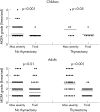Clinical and serological study of myasthenia gravis in HuBei Province, China
- PMID: 17088330
- PMCID: PMC2077769
- DOI: 10.1136/jnnp.2006.100545
Clinical and serological study of myasthenia gravis in HuBei Province, China
Abstract
Background: Ocular and childhood myasthenia gravis (MG) cases seem relatively more common in Oriental than in Caucasian populations, but there have been no comprehensive serological studies on patients from mainland China.
Methods: 391 unselected patients with MG attending Tongji Hospital in WuHan (the largest hospital in the province of HuBei, China) were studied during a 15-month period; most had already received treatment for their condition.
Results: The male to female ratio was 0.8. 50% of the patients were children (<15 years), and age at onset showed a single peak at between 5 and 10 years of age. 64% of the children and 66% of the adults were positive for acetylcholine receptor (AChR) antibodies but the antibody titres were lower than in similar Caucasian studies, although this was partly due to the high incidence of ocular MG. Of the 43 patients with generalised MG without AChR antibodies, only 1 had muscle-specific kinase antibodies (2.5%) and 2 had voltage-gated calcium channel antibodies indicating probable Lambert-Eaton myasthenic syndrome. 75% of the children, compared with only 28% of the adults, had ocular MG. Thymoma was evident by MRI in 1.5% of children and in 20% of adults. Despite most patients having received prednisone, very few had obtained full clinical remission.
Conclusion: This study emphasises the frequency of early childhood onset with ocular symptoms and shows that many of these patients have AChR antibodies. By contrast, patients presenting in later age seem to be very uncommon in comparison with recent studies in Caucasian populations.
Conflict of interest statement
Competing interests: The Department of Clinical Neurology in Oxford receives payments and royalties from AChR and MuSK antibody tests.
References
-
- Lindstrom J M, Seybold M E, Lennon V A.et al Antibody to acetylcholine receptor in myasthenia gravis: prevalence, clinical correlates, and diagnostic value. 1975 classical article. Neurology 199851933–939. - PubMed
-
- Hoch W, McConville J, Helms S.et al Auto‐antibodies to the receptor tyrosine kinase MuSK in patients with myasthenia gravis without acetycholine receptor antibodies. Nat Med 20017365–368. - PubMed
-
- Yeh J ‐ H, Chen W ‐ H, Chiu H ‐ C.et al Low frequency of MuSK antibody in generalized seronegative myasthenia gravis among Chinese. Neurology 2004622131 - PubMed
-
- Vincent A, Leite M I. Neuromuscular junction autoimmune disease: muscle specific kinase antibodies and treatments for myasthenia gravis. Curr Opin Neurol 200518519–525. - PubMed
-
- Chiu H ‐ C, Vincent A, Newsom‐Davis J.et al Myasthenia gravis: population differences in disease expression and acetylcholine receptor antibody titers between Chinese and Caucasians. Neurology 1987371854–1857. - PubMed
MeSH terms
Substances
LinkOut - more resources
Full Text Sources
Medical




